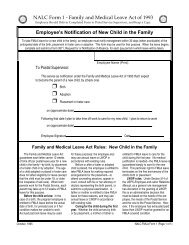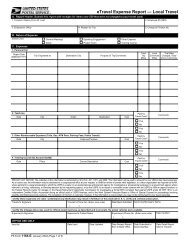Interviewing Postal Inspectors, Obtaining Their ... - NALC Branch 908
Interviewing Postal Inspectors, Obtaining Their ... - NALC Branch 908
Interviewing Postal Inspectors, Obtaining Their ... - NALC Branch 908
You also want an ePaper? Increase the reach of your titles
YUMPU automatically turns print PDFs into web optimized ePapers that Google loves.
<strong>NALC</strong> Arbitration Advocate Page 7<br />
Volume 2, Issue 2 May 1998<br />
1+066#6'/'062'<br />
Filing Grievances Under Article 14, USPS “No Defense” Argument<br />
ET 1+06 6#6'/'06<br />
#0& #('6;<br />
4+'8#0%'5<br />
Does a postal supervisor’s abusive<br />
behavior towards employees constitute<br />
a safety violation under Article<br />
14 as well as a violation of the<br />
Joint Statement on Violence and Behavior<br />
in the Workplace If the<br />
union believes it does and files a<br />
grievance directly at Step 2, can<br />
management render the case not<br />
arbitrable by arguing that (a) the<br />
subject matter of the case did not<br />
involve safety and health, so (b) the<br />
grievance was improperly filed at<br />
Step 2<br />
The answer seems obvious—<br />
that the Joint Statement is so clearly<br />
about safety and health that nobody<br />
would ever challenge a Joint Statement<br />
violation grieved under Article<br />
14 procedures. But it isn’t all<br />
that obvious to some postal managers.<br />
<strong>NALC</strong> advocates recently<br />
faced this management argument in<br />
two separate California cases. C-<br />
17420, Regional Arbitrator Nancy<br />
Hutt, October 7, 1997; C-17542, Regional<br />
Arbitrator Charles Rehmus,<br />
November 3, 1997.<br />
10) '#%*<br />
The first case arose in Long<br />
Beach, California, where one morning<br />
a letter carrier completed a<br />
Form 3996 requesting 30 minutes of<br />
auxiliary assistance after casing,<br />
pulling down and tying. The carrier<br />
brought the form to her supervisor,<br />
who ordered the grievant to<br />
return to her case, unbundle the<br />
mail and count it.<br />
During the mail count the carrier<br />
and supervisor argued, and another<br />
employee later testified that<br />
the supervisor was “bugging and<br />
bugging Grievant until she started<br />
crying.” After that employee left,<br />
the grievant reported that she told<br />
the supervisor that she (the supervisor)<br />
liked to see people suffer,<br />
and this exchange followed:<br />
Supervisor: That’s right you stupid<br />
bitch. I like to see you in misery.<br />
Grievant: You are the one who is<br />
stupid, you don’t know how to<br />
work with your employees.<br />
Supervisor: I’m not the one who has<br />
a [racial expletive deleted —Ed.]<br />
husband at home who kicks my ass<br />
all the time.<br />
Grievant: What kind of religious<br />
woman are you. You profess to be<br />
a Baptist, you go to hell.<br />
Supervisor: You are already in hell<br />
and so is your bitch whore mother.<br />
The grievant then left the work<br />
area, spoke with an apparently unconcerned<br />
station manager about<br />
the situation, filled out a Form 3971<br />
and left work. She was not disciplined.<br />
At the arbitration hearing a<br />
<strong>NALC</strong> shop steward bolstered the<br />
grievant’s testimony about the incident<br />
by reporting that the supervisor<br />
had previously yelled at employees<br />
and lost control. The arbitrator<br />
did not believe the supervisor’s<br />
contrary testimony, that she<br />
had spoken calmly and had not<br />
said anything derogatory to the<br />
grievant.<br />
4$+64#$+.+6; 557'<br />
Given the horrendous supervisory<br />
behavior in this case, it is little<br />
wonder that USPS pursued an arbitrability<br />
argument to bar a hearing<br />
on the merits. Management argued<br />
that the grievance, filed directly at<br />
Step 2 twelve days after the incident,<br />
was improperly filed under<br />
Article 14. Thus, management asserted,<br />
the grievance was untimely<br />
filed and not arbitrable.<br />
Arbitrator Hutt examined Article<br />
14, Section 2, which states:<br />
If an employee believes he/she<br />
is being required to work under<br />
unsafe conditions, such employee<br />
may:<br />
(a) notify such employee's<br />
supervisor who will immediately<br />
investigate the condition and<br />
take corrective action if necessary;<br />
(b) notify such employee's<br />
steward, if available, who may<br />
discuss the alleged unsafe condition<br />
with such employee's supervisor;<br />
(c) file a grievance at Step<br />
2 of the grievance procedure<br />
within fourteen (14) days of notifying<br />
such employee's supervisor<br />
if no corrective action is<br />
taken during the employee's<br />
tour; and/or<br />
(d) make a written report to<br />
the Union representative from<br />
the local Safety and Health<br />
Committee who may discuss<br />
the report with such employee's<br />
supervisor.<br />
(Continued on page 8)











